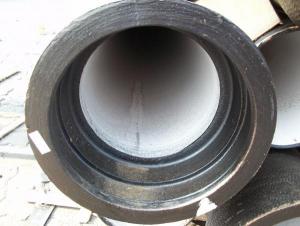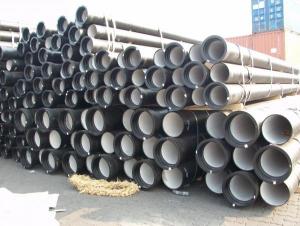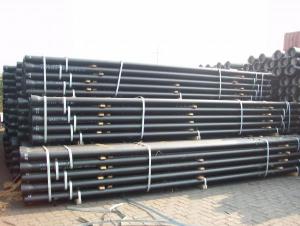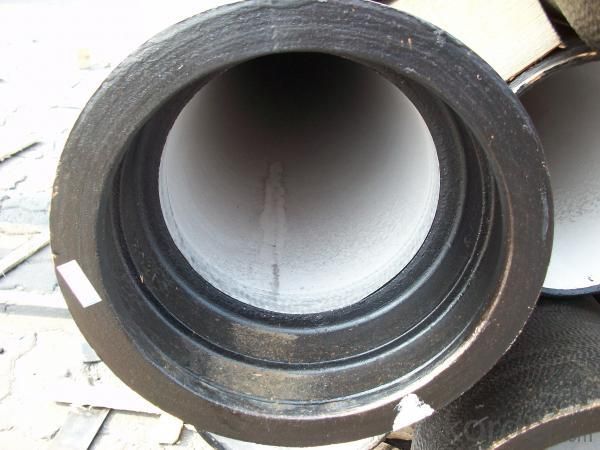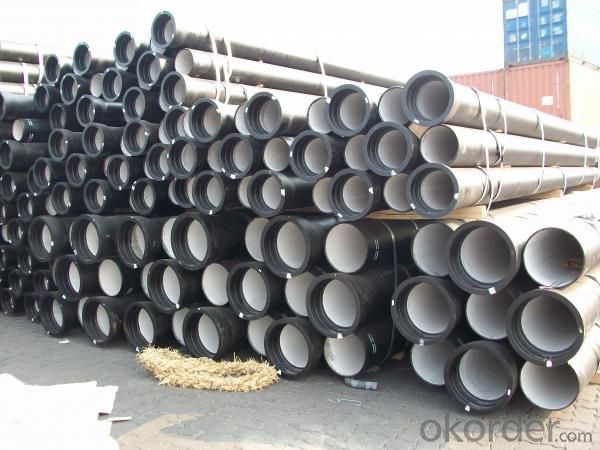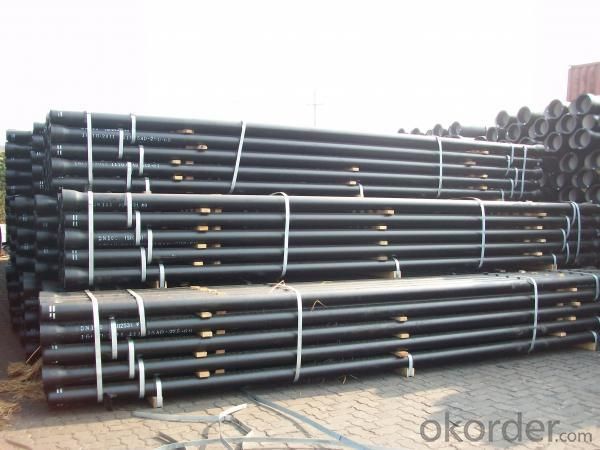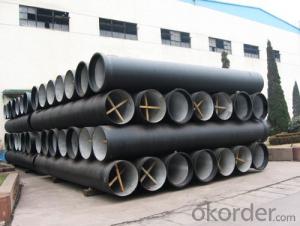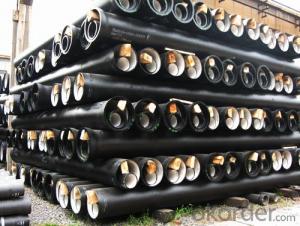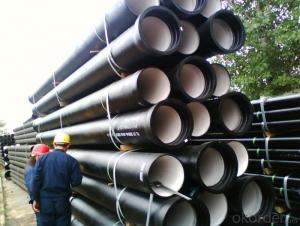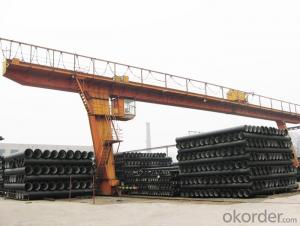Push On Joint T Type Ductile Cast Iron Pipe K9
- Loading Port:
- China main port
- Payment Terms:
- TT or LC
- Min Order Qty:
- 1 m.t.
- Supply Capability:
- 300000 m.t./month
OKorder Service Pledge
OKorder Financial Service
You Might Also Like
Product Name | Ductile Iron Pipe and Fittings |
Material | Ductile Iron |
Registered Brand | CMAX or CNBM |
Nominal Diameter | DN80 - DN2000mm |
Application | Water supply, Drainage, Civil Engineering,Construction & Housing, etc. |
Standard | EN545, EN598, ISO2531 |
Joint Type | T type, Flange type, Self-restrained type |
| Manufacture Standard | ISO 2531:1998/ EN 545:2006/EN 598:2007 |
| Coating Exterior | Zinc 130g/m2 according to ISO 8179-1 and bitumen coating 70 microns |
| Cement Interior | Portland Cement/ High Alumina Cement/ Sulphate Resisting Cement Lining according to ISO 4179 |
Company Information
CNBM INTERNATIONAL CORPORATION
Build your world with our materials.
We are a primary subsidiary of China National Building Material Group Co., Ltd.
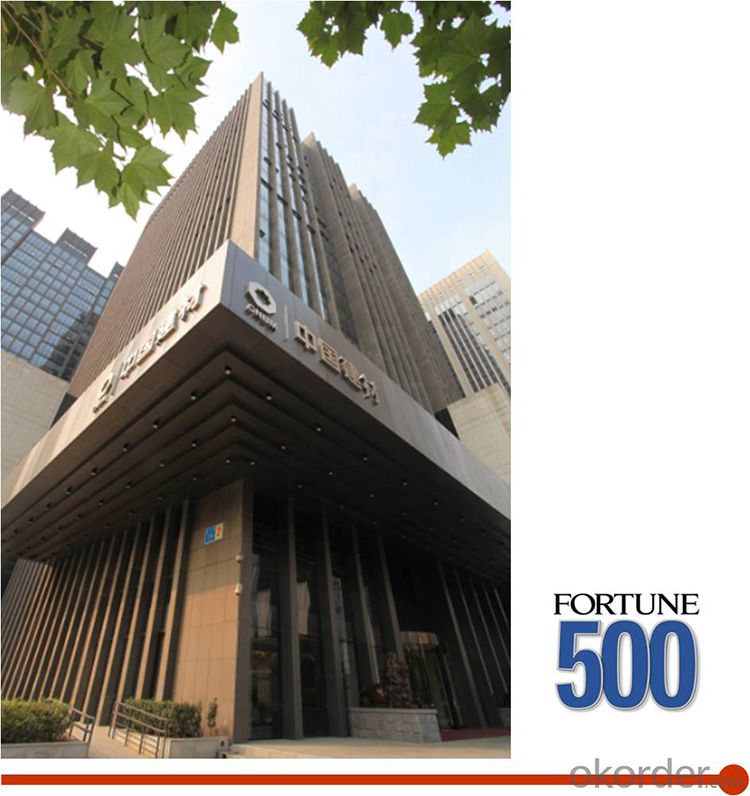
CNBM Water Section is one of the pioneering suppliers of pipes, fittings and systems in China.
We are leading the market by supplying:Ductile iron water and sewer pipes, fittings, valves and couplings and adaptors
Ductile iron access covers and gratings.
Other types of pipes and fittings.
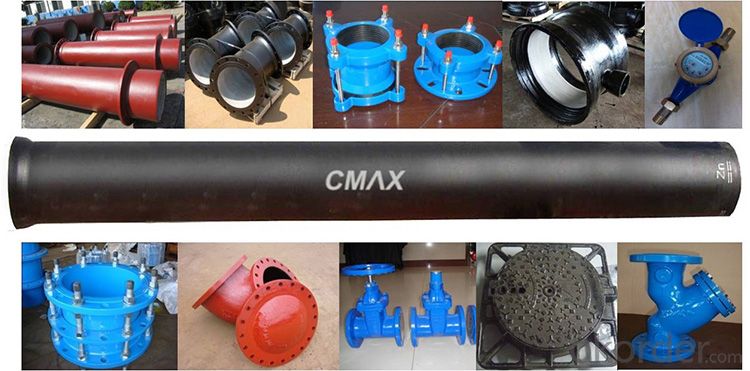
Push-on Joint T-type Joint
The T-type joint designs incorporate a single rubber sealing gasket assuring a tight, permanent seal. The "push-on" type joint is easy to assemble and fast to install. The push-on design eliminates the need for glands and fasteners. The rubber gasket fits inside the contour of the bell socket, which seats the gasket.The plain-end (spigot) of each pipe is beveled to further ease assembly.
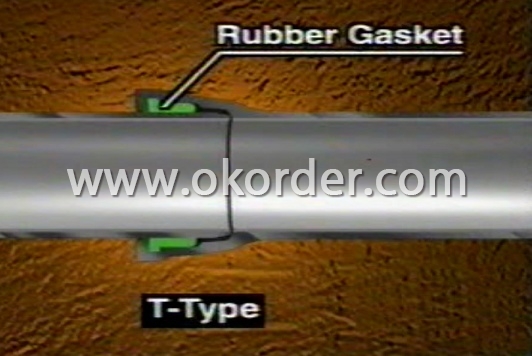
Certification
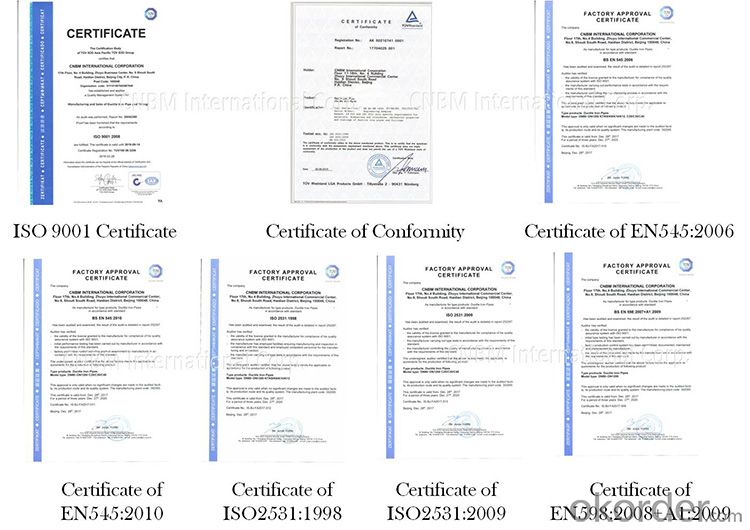
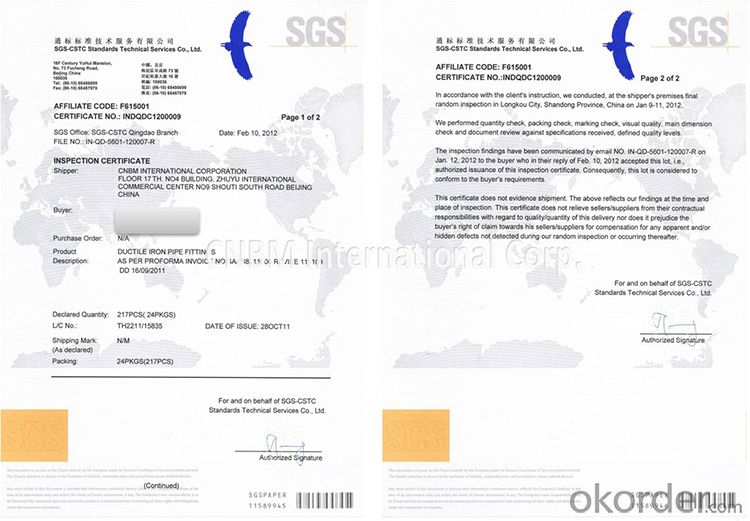
Package & Delivery
DN80-300: Packed in bundle
DN350-2000: Loose pack
Container loading
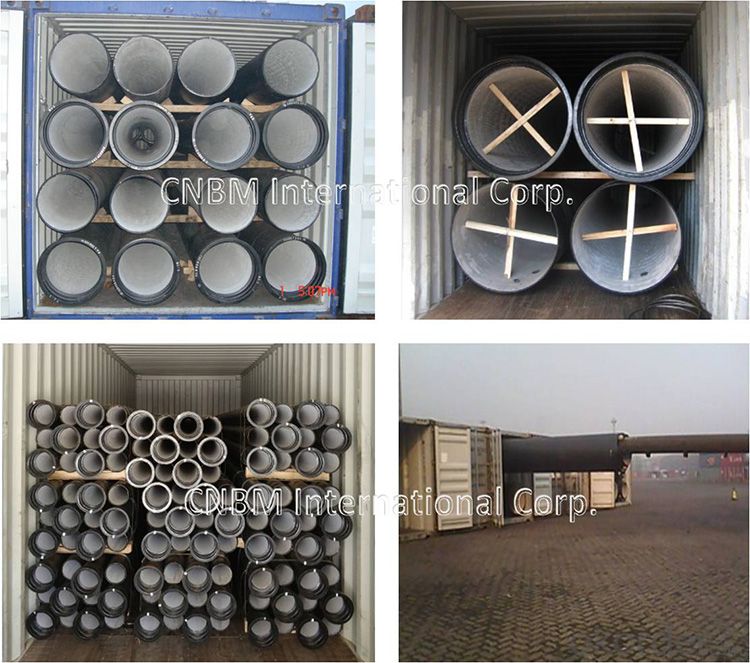
Bulk loading
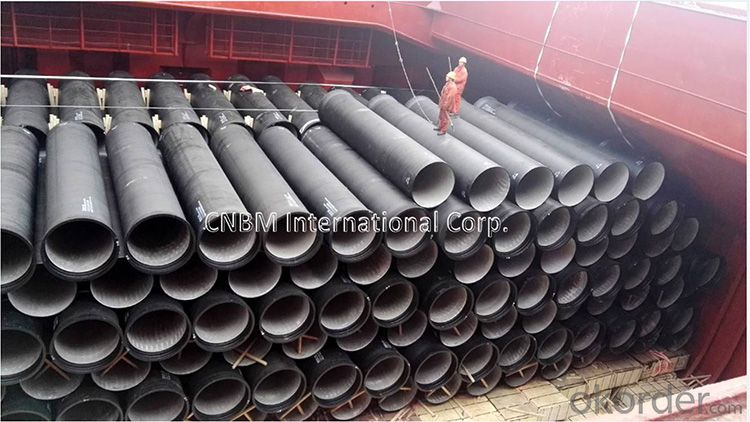
Related Projects
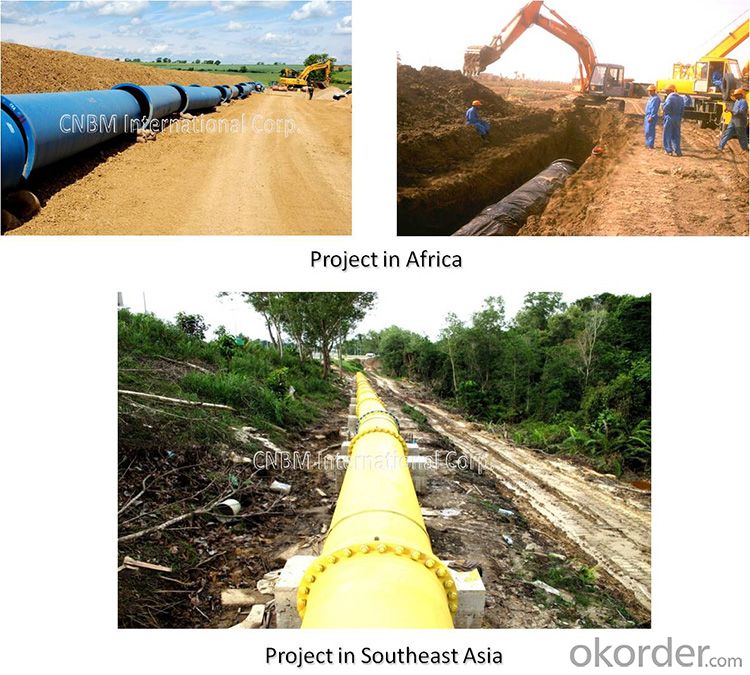
Why choose CNBM?
◆Government Credit
CNBM Intl is a primary subsidiary of CNBM Group, a Chinese central governmental enterprise. We’ve been accessed by D&B as Duns Registered 4A1 level since 2012, which endorsed us as one of the safest suppliers to work with in China.
◆Industry Leader
As an industry leader, CNBM Intl is also a top-ranking buyer of iron ore and coking coal in the world. Our raw materials’ cost and quality are under strict control from A to Z.
◆Strong Logistics Capability
1. Professional Logistics team
2. 20,000 containers + 30,000 M3bulk vessel per year = Cost-effective and Prioritized Shipments
3. 50000 M2 Dubai Logistics Park solely-owned by CNBM
◆VIP services
1. Professional Sales Team
2. Multi-language Sales Managers
3. One-to-One fast response
◆One-Stop Purchase Solution
Over 800 kinds of industrial products within CNBM product range.
Our factory
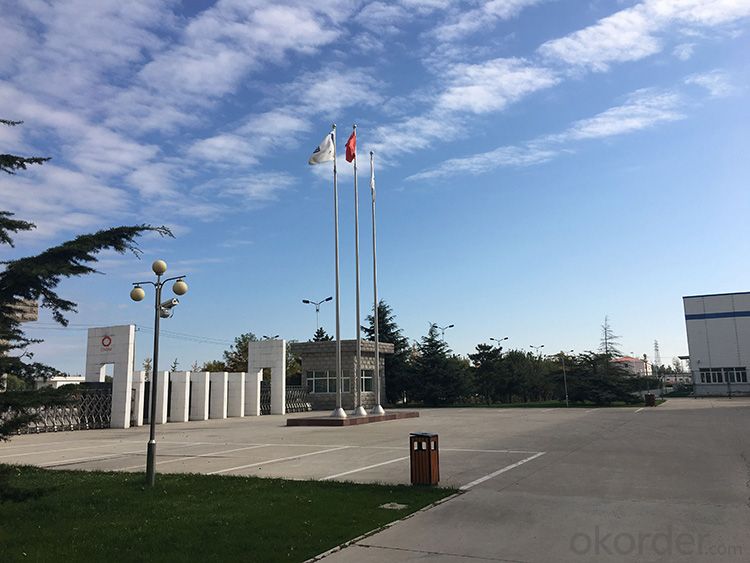
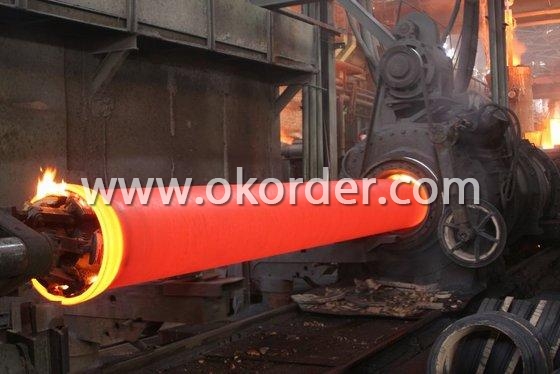
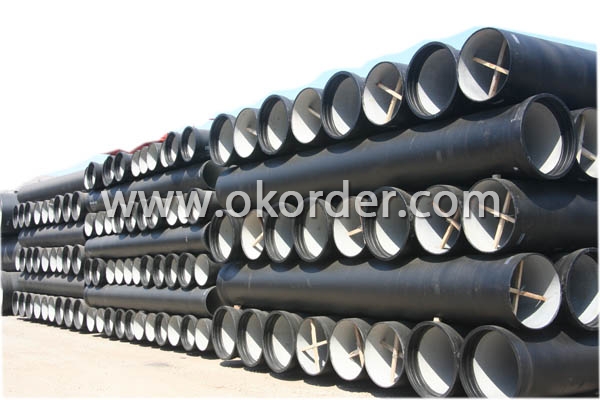
Our Services
◆Usually you can get our quotation within ONE day. In particular cases, we are committed to providing it within 48 hours.
◆Total technical supports from our senior consultant engineers.
◆Timely & Cost-efficient delivery.
◆Real time information of Chinese market.
◆Special discounts and protective policies provided to our distributors/partners.
FAQ
Q:Are you a trading company or manufacturer?
A:CNBM is a large-scale central governmental industrial group with its own manufacturing sector, research and development sector, trading sector and logistics sector.
Q:I have some special requirement about specifications.
A:We have a well-rounded product range, which endows us with the capability of applying many special specifications. Please feel free to contact us with yours.
Q:Do you accept OEM service?
A:Yes, we do.
Q:What is your delivery time?
A:It depends on the size/complexity of your order and our own production schedule. Usually we provide a faster delivery than the industry’s average.
Q:What is the payment term?
A:Our payment terms are negotiable.
Q:Can I have my own logo on the product?
A:Sure, we can apply your own logo on the products according to your drawings.
Q:Can I get samples?
A:Yes, you can. And you only need to bear the delivery costs, if the samples are not too big.
Q:How is your company's experience?
A:We have an over 20 years of experience in water industry and been exporting to over 56 countries. We cherish our reputation as a company and our customers love us.
Q:Can I request to change the form of packaging and transportation?
A:Sure, we’re glad to fulfill your requirement. Yet please understand that extra costs may occur if the form of packaging and transportation are changed.
- Q: How does ductile iron pipe perform in areas with high soil settlement?
- Ductile iron pipe is known for its exceptional performance in areas with high soil settlement. Due to its inherent strength and durability, it can withstand the pressures exerted by settling soil without compromising its structural integrity. The flexibility of ductile iron pipe allows it to accommodate ground movements caused by soil settlement, thus minimizing the risk of pipe failure or damage. Its ability to adapt to these movements helps prevent cracks, leaks, and breaks that could occur in more rigid pipe materials. Moreover, ductile iron pipe's strong resistance to corrosion provides an added advantage in high soil settlement areas. It can withstand the corrosive effects of the soil and other environmental factors, ensuring the longevity and reliability of the pipe system. In areas with high soil settlement, ductile iron pipe is often the preferred choice due to its ability to handle ground movements without sacrificing performance. Its strength, flexibility, and resistance to corrosion make it an ideal solution for maintaining a robust and efficient water distribution system even in challenging soil conditions.
- Q: Are ductile iron pipes suitable for use in mining applications?
- Yes, ductile iron pipes are suitable for use in mining applications. They possess excellent strength, durability, and resistance to corrosion, making them ideal for transporting fluids and materials in the harsh and demanding conditions of mining operations. Additionally, their ductility enables them to withstand high pressures and impacts, ensuring reliable performance and long service life in mining environments.
- Q: How does ductile iron pipe resist internal corrosion?
- Ductile iron pipe resists internal corrosion through a combination of its unique material properties and protective coatings. Firstly, ductile iron, also known as nodular cast iron, is made by adding magnesium to molten iron, which causes the graphite in the material to be nodular or spherical in shape. This results in a more flexible and elastic material compared to traditional cast iron, making it less prone to cracking or fracturing under stress. Additionally, ductile iron has a dense, microstructure with a high carbon content, which acts as a barrier to prevent corrosive elements from penetrating the pipe's surface. This inherent resistance to corrosion makes ductile iron pipe suitable for carrying various fluids such as water, sewage, and chemicals without the risk of degradation over time. Furthermore, ductile iron pipes are often internally lined with protective coatings to further enhance their resistance to corrosion. These coatings, such as cement mortar or epoxy, create a barrier between the pipe's surface and the fluid it carries, preventing direct contact and reducing the likelihood of corrosion. These linings are applied during the manufacturing process, ensuring a consistent and durable protection throughout the entire length of the pipe. In summary, ductile iron pipe resists internal corrosion due to its material composition, including the nodular graphite structure and high carbon content, as well as the application of protective coatings. This combination of factors ensures the longevity and reliability of ductile iron pipes in various applications, even in corrosive environments.
- Q: DN300 what's the price of the ductile iron pipe / the weight and the price of one meter?
- Graphite is exist in spherical form, usually graphite size is 6-7, casting spheroidization grade control requirements for 1-3 quality (spheroidization rate greater than 80%), so the mechanical properties of the material itself has been improved, has the essence of iron, steel performance.
- Q: Are ductile iron pipes suitable for use in saltwater environments?
- Ductile iron pipes are generally not considered suitable for use in saltwater environments due to their susceptibility to corrosion. Saltwater is highly corrosive and can accelerate the degradation of ductile iron pipes. While ductile iron pipes offer good strength and durability, they have a higher likelihood of corroding in saltwater compared to other materials like stainless steel or corrosion-resistant alloys. Therefore, it is recommended to use materials specifically designed for saltwater environments to ensure long-term functionality and avoid costly repairs or replacements.
- Q: Ductile iron pipe is how many years warranty
- Ductile iron pipe warranty is unlimited.
- Q: Are ductile iron pipes suitable for bridge crossings?
- Yes, ductile iron pipes are suitable for bridge crossings. Ductile iron pipes are known for their high strength and durability, making them a reliable choice for various applications, including bridge crossings. These pipes can withstand heavy loads and are resistant to corrosion, which is especially important in bridge crossings where they may be exposed to harsh environmental conditions. Additionally, ductile iron pipes have the ability to flex and withstand ground movement, making them ideal for bridge crossings where the ground may shift or settle over time. Overall, ductile iron pipes offer the necessary characteristics to ensure the safe and efficient transportation of fluids or materials across bridges.
- Q: How is ductile iron pipe protected against external corrosion?
- Ductile iron pipe is protected against external corrosion through a variety of methods that ensure its durability and longevity. One common method is the application of protective coatings. The pipe is typically coated with a layer of zinc or asphaltic material, which acts as a barrier between the iron pipe and the surrounding environment. This coating helps to prevent direct contact between the pipe and corrosive elements such as soil, moisture, and chemicals, thereby reducing the risk of corrosion. Additionally, ductile iron pipes are often wrapped with a layer of polyethylene or polypropylene tape. This tape provides an extra layer of protection against external corrosion by serving as a physical barrier that shields the pipe from moisture and other potentially corrosive substances. The tape is applied with care to ensure complete coverage and adherence to the pipe's surface. Furthermore, cathodic protection is commonly employed to safeguard ductile iron pipes against external corrosion. This technique involves the installation of sacrificial anodes or impressed current systems near the pipe. These anodes generate a protective electrical current that counteracts the corrosion process, effectively inhibiting the deterioration of the pipe's surface. Lastly, proper installation practices play a crucial role in preventing external corrosion. It is essential to ensure that the pipe is buried at an appropriate depth, allowing for adequate soil coverage. This helps to minimize exposure to corrosive elements and maintain the integrity of the protective coatings. Additionally, proper backfilling techniques and the use of corrosion-resistant bedding materials can further enhance the pipe's resistance to external corrosion. In conclusion, ductile iron pipe is protected against external corrosion through a combination of protective coatings, tape wrapping, cathodic protection systems, and proper installation practices. These measures work together to provide a robust defense against the corrosive forces that the pipe may encounter, ensuring its longevity and reliability in various applications.
- Q: Can ductile iron pipes be used in areas with high levels of heavy metal contamination?
- Ductile iron pipes can indeed be used in areas with high levels of heavy metal contamination. Ductile iron is a strong and durable material that is resistant to corrosion, making it suitable for various environmental conditions, including areas with heavy metal contamination. The high levels of heavy metals in the surrounding soil or water do not affect the structural integrity or performance of ductile iron pipes. These pipes have a protective lining, usually made of cement mortar or polyethylene, which acts as a barrier between the pipe and the surrounding environment. This lining prevents the heavy metals from leaching into the water flowing through the pipes. Furthermore, ductile iron pipes have been proven to be highly resistant to chemical corrosion, including the corrosion caused by heavy metals. They have been extensively used in industrial applications where heavy metal contamination is common, such as wastewater treatment plants, industrial facilities, and mining sites. However, it is important to note that while ductile iron pipes can withstand high levels of heavy metal contamination, regular monitoring and maintenance are still necessary. This ensures that the protective lining remains intact and any potential issues are addressed promptly. In summary, ductile iron pipes are a suitable choice for areas with high levels of heavy metal contamination. Their strength, durability, and resistance to corrosion make them reliable for transporting water and other fluids, even in challenging environments.
- Q: Can ductile iron pipes be used for wastewater treatment plants?
- Yes, ductile iron pipes can be used for wastewater treatment plants. Ductile iron pipes are known for their strength and durability, making them suitable for handling the harsh and corrosive environment of wastewater treatment plants. These pipes can withstand high pressures and are resistant to corrosion, which is essential in handling wastewater and various chemicals involved in the treatment process. Ductile iron pipes also have the advantage of being easy to install and maintain, with a long service life. Therefore, they are commonly used in wastewater treatment plants for transporting and distributing wastewater throughout the facility.
1. Manufacturer Overview
| Location | Henan, China |
| Year Established | 1958 |
| Annual Output Value | Below US$1 Million |
| Main Markets | Mid East, Africa, South Asia, Eastern Asia |
| Company Certifications | ISO 9001:2008;ISO2531:2000 |
2. Manufacturer Certificates
| a) Certification Name | |
| Range | |
| Reference | |
| Validity Period |
3. Manufacturer Capability
| a) Trade Capacity | |
| Nearest Port | Tianjin; Qingdao |
| Export Percentage | 1% - 10% |
| No.of Employees in Trade Department | 3000 People |
| Language Spoken: | English; Chinese; Spain; Alabic |
| b) Factory Information | |
| Factory Size: | Above 150,000 square meters |
| No. of Production Lines | Above 6 |
| Contract Manufacturing | OEM Service Offered; Design Service Offered |
| Product Price Range | Average |
Send your message to us
Push On Joint T Type Ductile Cast Iron Pipe K9
- Loading Port:
- China main port
- Payment Terms:
- TT or LC
- Min Order Qty:
- 1 m.t.
- Supply Capability:
- 300000 m.t./month
OKorder Service Pledge
OKorder Financial Service
Similar products
Hot products
Hot Searches
Related keywords
